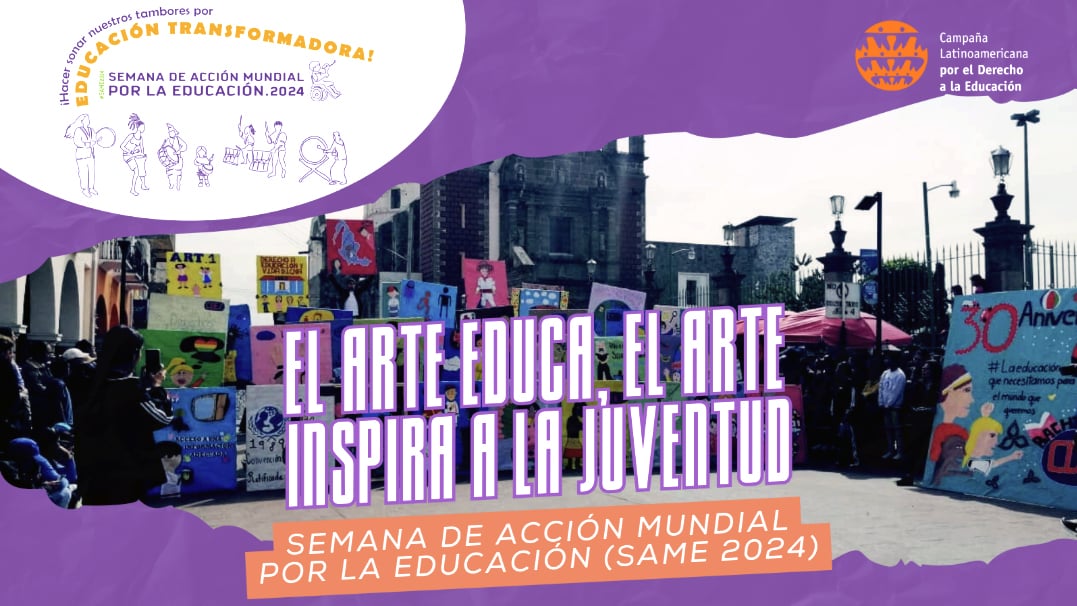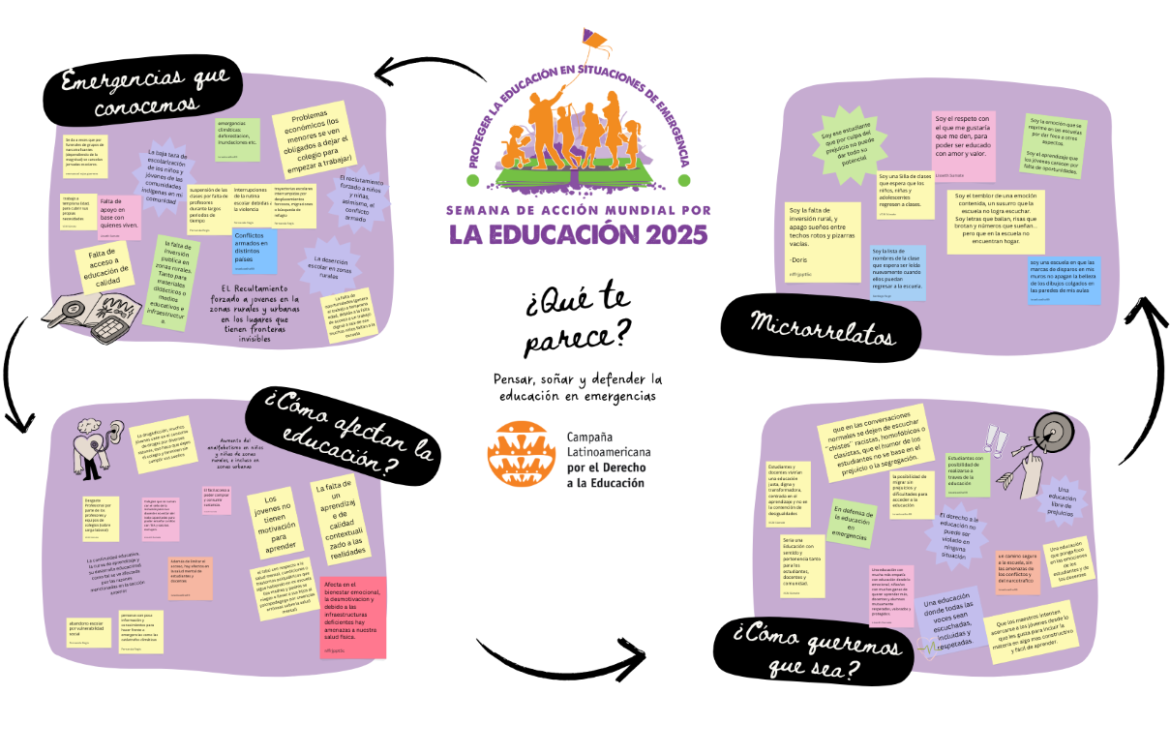
Democracy Laboratory to Promote the Right to Education and Cultivate Hope
Young members of the Latin American Campaign for the Right to Education (CLADE) has set up a platform for understanding and developing democracy and protecting the right to education. Read along for Israel Quirino’s story on how he discovered his voice and began to find answers to some of the big questions about democracy.
Just like any child, I asked as many questions as I could, every day, to everyone. One day, during an election year in Brazil, I asked my dad what the word “democracy” meant. I had probably heard it on TV. My father, who grew up under military dictatorship, stopped to think for a second about how to explain such a complex concept, and answered: democracy is when we vote. For a kid, that was more than enough. I understood that democracy was when the gym teacher decided whether we would play soccer or volleyball by asking us to raise our hands.
The concept was simple: the majority wins and cheers after the announcement is made. The fact that the majority always wanted soccer didn’t seem to bother me, probably because I was part of the majority. But shouldn’t we play volleyball for a change? Some people wanted that, and we would probably have fun playing volleyball as well. What if democracy is more than just counting hands and forming majorities? Is there an alternative that can please everyone? Is it possible to make democracy more democratic?
From being heard to leading the way: CLADE’s youth platform
As a teenager, these questions started boiling in my head and, as a young person, I found a group that had the same concerns as I did: CLADE’s Youth Working Group.
The Latin American Campaign for the Right to Education (CLADE) is a regional network formed by 35 members from 18 different countries in the region. There are plenty of adolescents and youth who are part of CLADE’s members, and, in 2022, they demanded a platform for engagement in CLADE. This platform was quickly established and strengthened by Education Out Loud funding provided to CLADE by 2023. CLADE is a very diverse group, with different advocacy backgrounds, ages and cultures, but each member is equally committed to establishing democratic foundations for the Youth Working Group (YWG).
Just as I was, they were tired of having an adult showing them two different options and asking them to vote. They wanted to define their options and develop their own mechanism for decision making, while also taking advantage of all the experience from adults within CLADE, and tackling adult-centrism by fostering intergenerational dialogue.
Learning by doing: Democracy in motion
With this blank canvas in hand, we had a challenge from the get-go: how do we organize ourselves democratically? Everybody shared the same concerns, but nobody had the answers. Over the past few years, 65 people have engaged in the YWG to collaborate in answering this question. We concluded that there was no clear recipe for the democracy we wanted, and that debating such questions would give us only partial answers. We felt that we should put our ideas into practice, taking advantage of this safe space. As Diana (29, Honduras) put it, “We have our diversities, our own singularities, and this makes this space unique to comprehend the diversity of our region.”
To do this, no voice should go unheard, and no idea should go untested. Freedom to express and freedom to experience is what makes CLADE’s Youth Working Group a democracy laboratory.
Laying the groundwork
We start from the assumption that in a democracy everyone can hear and be heard, and everyone leaves space for changing their own opinion by listening to others. We also believe that a democracy should give people the chance to develop their full potential, even when that means doing things differently.
Carlos (15, Paraguay) highlights this, mentioning that “Besides being heard, I also feel useful, […] because what we are saying will end in a powerful youth representation in an international space.”
Establishing this view as common sense has been our most significant result. Sol (21, Argentina) has been part of the YWG since the beginning and says that the group “always tries to make space so everyone can engage, and every voice can be heard”.
It is also relevant for young people to value their own strengths and possibilities for collaboration, as acknowledged by Andres (28, Colombia): “We noticed that the youth have a lot to learn but also have a lot to give. Not only because of being young, but also because of our vision drawn from the present, from the realities we live in and the future we seek and are working to build.”

Applying the democracy lab approach to advocacy on education in emergencies
An example of how the concept of the democracy laboratory influences our daily activities is how we organized ourselves to engage with the Global Action Week for Education (GAWE) 2025. Since GAWE’s theme for 2025 was to protect education in emergencies, we asked ourselves: what do we know about this? What emotions does it generate in us? What does it make us think about?
Through collective dialogue, we understood that multiple emergencies affect our region, so our actions should not focus on a specific emergency. Also, we reached the conclusion that discussing the subject might raise fear, anxieties and feelings that could paralyze youth, instead of calling them to action. With this diagnostic in mind, we tried to develop our own approach, avoiding traditional strategies that might be unappealing or too formal for a younger audience. In this phase, as both scientists and samples in our laboratory, we had to pose two more questions: what would we like to try? And what would we like to engage with?
During this process, David (23, Colombia), who has also been part of the YWG since the beginning, noticed that issues like education in emergencies “do not fit in a report. There are pains, questions, dreams that only art can process”. So that was our mission: to open a platform where young people could share what they know about education in emergencies, get to know each other’s context and express their feelings through art.
One evening, Caleb (33, Bolivia), Sol (21, Argentina) and Tatiana (29, Colombia), guided an intergenerational group through questions on the emergencies we knew, how they affected education and what our ideal scenario would be. David took care of the creative part, animating each participant to develop a micro story depicting education in emergencies.
Cultivating democracy, our way
This workshop produced two results. The first was 10 micro stories, summarized in an audio file and shared on CLADE’s website, where young people mention their concerns, beliefs and hopes for education in emergencies. The second is more subtle, and it has to do with how the YWG operates: cultivating democratic values between its participants. We aim to share these values in every opportunity for engagement. We took this approach to develop statements for the 3rd Human Rights Forum, for the Summit of the Future, and for the 4th International Conference on Financing for Development.
This also guides our representatives in permanent forums, such as the YWG mobilized by the UNESCO-NGO liaison committee and the Youth Action Group maintained by the Global Campaign for Education. Through collective collaboration, any member of CLADE’s YWG can speak on behalf of the group and represent it in advocacy spaces. Our strategy to build democracy through experimentation has given us much more than procedures to guide our activities.
With authoritarianism on the rise globally, our democracy laboratory also exists as a beacon of hope. It exists because we know that those who engage in it will also take this perspective forward, and this cycle will repeat itself until every voice is taken into consideration.
